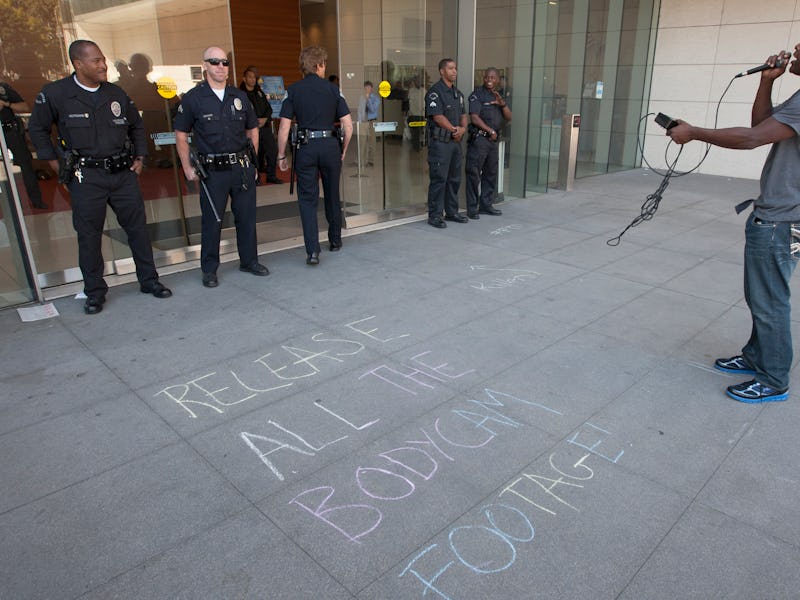Police Are Using Body Cameras as Instant Replay
Recordings were supposed to help community members push back against law enforcement, but that's not what's happening.

A new report from a civil liberties group has found that police body camera programs aren’t protecting citizens in any real way. Police Body Worn Cameras: A Policy Scorecard was released by The Leadership Conference on Human and Civil Rights and Upturn, a think tank that focuses on technology. It is just about as scathing as a thoroughly researched report can be, scathing enough to cast doubt on the idea of law enforcement participating in meaningful self-surveillance.
The report, which looks at 50 cities across the country, finds that not a single department had met the eight criteria laid out for body camera programs by civil society groups in May 2015. After being asked to make their policies public, limit recording outside of confrontations, and limit the collection of biometric data, departments basically did whatever they were gonna do in the first place.
Among the reports more disturbing findings was that “none of the department policies we analyzed have a blanket limitation on officer review of footage before filing an initial written incident report.” This means that cops can look over their footage prior to writing a report that should be based on their memory and experience of the event. Giving police the opportunity to review footage could allow them to massage their memory to match what’s on the video, instead of documenting their state of mind during an interaction with the public. This does more to protect cops than it does to protect private citizens.
Some cities have partial restrictions on allowing officers to review footage. Oakland, for example, prohibits police from looking over footage prior to writing an initial report in cases where the officer’s actions resulted in serious bodily harm to a person.
Of the cities the report studied, only 13 met three or more of the eight privacy and accountability criteria.
The report comes in the wake of two high-profile police killings of black men in recent weeks. On July 5, police in Baton Rouge shot and killed Alton Sterling. Less than 48 hours later, a police officer in suburban Minneapolis killed Philando Castile during a traffic stop. Video of both incidents went viral and led to widespread protests in cities nationwide.
As cameras become increasingly powerful and facial recognition programs become more sophisticated, there is significant concern among privacy advocates that the widespread use of police body cameras could amount to wholesale surveillance of certain communities. People of color and immigrant populations are especially at risk of having their privacy violated by police cameras, an especially ironic outcome given that body cameras were sold to the public as a tool for holding police accountable.
Police departments regularly monitor social media feeds of people suspected of belonging to gangs. Linking digital space to physical space is something that law enforcement officials are increasingly interested in doing using geotagged Twitter or Facebook posts to determine where a suspect has been — and police cameras with facial recognition capabilities could go a long way in making that happen. If a person’s face has been entered into a police database — or “enrolled,” in industry-speak – either because they have had their mugshot taken (or through some other way), then a body camera could identify that individual and provide an officer with a Facebook or Twitter profile immediately.
One positive trend the scorecard identified was that four departments — Cincinnati, Chicago, Washington, DC, and Parker, Colorado – allow citizens who wish to make a complaint about police misconduct to review footage of themselves.
Police misconduct in the United States is under the microscope to a degree not seen in decades, following the killing of Mike Brown in Ferguson and the protests across the country that have followed since then. In New York City, activists on Monday called for the firing of NYPD commissioner Bill Bratton – an early implementer of “broken windows” policing, a policy often criticized for focusing almost exclusively on black communities. On Tuesday, Bratton stepped down. His resignation was reportedly in the works for some time, but the announcement excited activists nonetheless.